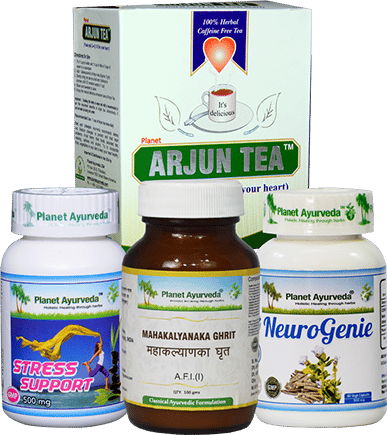Ayurvedic Management for PTSD (Post Traumatic Stress Disorder)
Abstract
PTSD or Post traumatic stress disorder is a psychiatric disease that can occur in human beings who have experienced or witnessed a worrying occasion such as a natural catastrophe, a terrorist act, a serious accident, battle/fight, or rape or who’ve been threatened with death, self harm/suicide, or sexual violence. People with PTSD have excessive, demanding minds and emotions associated with their experience that remain long after the traumatic event has ended. They can also relive the event via nightmares or flashbacks, may experience disappointment, anger or fear. They might feel detached or estranged from other human beings. In this article you can get all the information about PTSD and its Ayurvedic treatment and management.

Introduction To PTSD
Posttraumatic strain disease (PTSD) was formerly known as battle fatigue syndrome or shell shock. It is a serious situation which could develop after someone has experienced or witnessed a stressful or terrifying event wherein there was extreme physical harm or threat. PTSD is an enduring result of stressful ordeals that cause extreme fear, helplessness, or horror. It can occur in things that include physical or sexual assault, an accident, the unexpected death of a loved one, natural disaster or war. Not only the people who suffered these situations can develop PTSD but their family members and even rescue workers and emergency help people. Certain feelings can be developed after a traumatic event like anger, fear, nervousness and shock which goes away on its own after some days but in case of PTSD, these feelings persist.
Signs And Symptoms Of PTSD
Signs and symptoms of PTSD are generally divided into four types, i.e. avoidance, intrusive memories, mood and thinking having negative changes, and emotional reactions and physical changes. They can vary from one person to another or may be over time.
Avoidance
- Avoiding places, activities or people that remind you of the worrying event
- Trying to keep away from talking or wondering about the specific horrifying event
Intrusive Memories
- Having flashbacks which feel like reliving the traumatic situation as if it had been happening once more
- Unwanted, recurrent, distressing recollections of the worrying event
- Bodily reactions or intense emotional distress to something which reminds them of the incident
- Nightmares or Upsetting desires about the disturbing event
Mood And Thinking Having Negative Changes
- Hopelessness about the destiny
- Thoughts are negative about oneself, or everyone around
- Memory troubles, along with not remembering essential factors of the terrifying event
- Feeling of detachment from friends and family
- Difficulty in retaining one’s close relationships
Emotional Reactions And Physical Changes
- Person is always on guard for hazard
- Being startled or nervous without any cause
- Drinking an excessive amount of alcohol or driving too fast
- Difficulty in concentrating
- Difficulty in sleeping
There can also be certain symptoms in case of 6 years old children or younger ones like nightmare which can include aspects of the earlier traumatic condition and sometimes they can even re-enact the aspects of traumatic events while playing.
Causes Of PTSD
Everyone reacts to traumatic conditions in a different way. Every person is precise in their ability to manage worry, stress and the risk posed by a worrying event or scenario. Hence due to that cause not everybody who suffers a trauma will get affected by PTSD. It also depends on the sort of aid and help a person receives from his own family members, friends and emergency professionals after the trauma may additionally contribute to the development of PTSD.
People who have been uncovered to life-threatening conditions repeatedly or who had been abused as children are more at risk for having PTSD. Victims of trauma related to physical and sexual assault are more at risk to have severe PTSD. People who have a history of other mental fitness troubles, have a history of alcohol or drug abuse or have blood relatives with mental illnesses are more likely to have PTSD.
Diagnosis Of PTSD
PTSD can be diagnosed only after at least 1 month has surpassed after the traumatic event occurred. If symptoms of PTSD are still there then the you doctor will start an assessment through conducting a whole clinical and bodily examination. Although there are not any lab tests to mainly diagnose PTSD, the physician may also use various tests to rule out presence of any bodily condition which may cause the signs.
PTSD Management
Conventional treatment of PTSD includes antidepressant medicines to relieve anxiety along with mood stabilizers like Depakote, selective serotonin reuptake inhibitors like Celexa, atypical antipsychotics and blood pressure medicines. Tranquilizers are also used which can cause addiction or dependence.
Ayurvedic Management Of PTSD
Ayurvedic treatment aims at helping a person to cope better with the traumatic incident and get out of it in a healthy way faster. There are certain herbal remedies and Ayurvedic therapy which helps in dealing with the past and managing the deep lying memories in the mind.
Herbal Remedies For PTSD By Planet Ayurveda
Planet Ayurveda is a very well known name in the Ayurvedic department not only in India but throughout the world. It is a reputed herbal pharmaceutical company that deals in the production of authentic and most effective herbal remedies using the best quality of herbs and other natural compounds. For PTSD, Planet Ayurveda offers a combination of herbal remedies.
Products List
- Neurogenie Capsules
- Stress Support
- Mahakalyanaka Ghrit
- Arjun Tea
DOSAGE/USAGE
- Neurogenie Capsules – Take 2 capsules twice daily after meals with plain water.
- Stress Support – Take 1 capsule twice daily after meals with plain water.
- Mahakalyanaka Ghrit – Take 1 teaspoon twice daily with warm water.
- Arjun Tea – Take 1 cup of tea daily.
Products Description
1. Neurogenie Capsules
These Ayurvedic capsules are formulated using two medicinal herbs, i.e. Ashwagandha (Withania somnifera) and Brahmi (Bacopa monnieri). It helps in treating mental illnesses, fights anxiety and maintains healthy functioning of the brain.
2. Stress Support
Stress support are the herbal capsules formulated using herbs like Brahmi (Bacopa monnieri), Ashwagandha (Withania somnifera), and Tagar (Valeriana wallichii). These capsules as the name suggests help in treating the stress which is one of the main problems in PTSD.
3. Mahakalyanaka Ghrit
There are number of medicinal herbs in it like Krishna sariva (Ichnocarpus frutescens), Shweta sariva (Hemidesmus indicus), Daru haridra (Berberis aristata), Prishniparni (Uraria picta ) etc. Mahakalyanaka ghrit helps in treating mental illnesses like Schizophrenia, improves memory, calms the mind and helps in treating inflammation in the body.
4. Arjun Tea
This herbal tea is prepared using wonderful herbs like Arjuna (Terminalia arjuna), Dalchini (Cinnamomum zeylanicum), Punarnava (Boerhavia diffusa), Chhoti elaichi (Elettaria cardamomum), and Pipal tvak (Ficus religiosa). Arjun tea helps in controlling the high blood pressure naturally and improves the blood circulation in the body.
Conclusion
A person suffering from PTSD needs professional help urgently so whenever you see such symptoms in any of your friends, family or known do contact the nearby doctor as soon as possible. Our experts at Planet Ayurveda are also there to help such patients.




